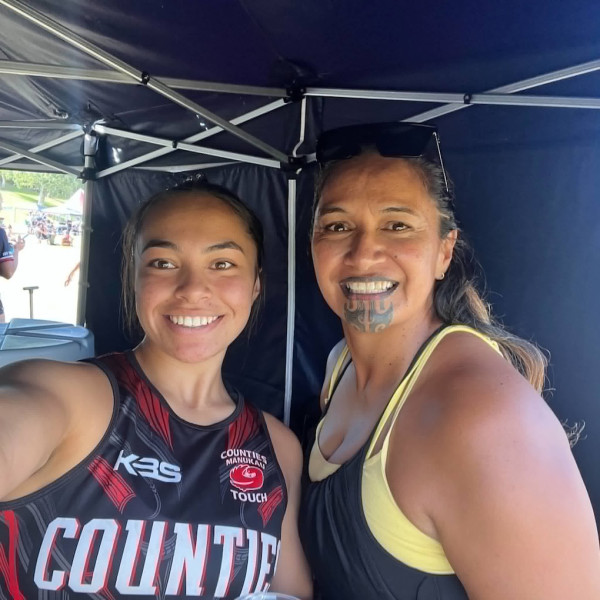Kura kaupapa Māori follow their own system which is different to the state school system. It’s a system which heavily focuses on whānau and self-development.
Kura kaupapa Māori use kapa haka, mātauranga Māori and the environment to teach aspects of tikanga and te ao Māori.
Re: News spoke to former kura kaupapa teacher Nikora Irimana (Tainui, Ngāpuhi, Te Arawa) about kura kaupapa Māori and the differences between kura kaupapa Māori and mainstream schools.

Nikora (right) with her daughter (left). Photo supplied.
When and why was kura kaupapa created?
We have a learning style where as a whānau, we learn better together.
This concept dissipated within the ‘60s and ‘70s. By the ‘80s, there was a movement towards having kura kaupapa.
By 1991, the movement of kura kaupapa Māori came about, and it's just based on the philosophies of our ancestors, of our tūpuna.
It's based upon values that our elders grew up with. We find those philosophies really important, particularly the ones about identity.
Knowing your pepeha, knowing where your maunga is, and knowing where your awa is are just little bits of our philosophy around kura kaupapa.
Teaching it and applying it can give oranga (well-being) back to yourself, empowering the learner or the student.
And that in itself, gives back not just their own mana, but rangatiratanga.
How is it different from a mainstream school?
You get to learn about the beginning and end of te ao Māori.
Generally, we will learn about Rangi and Papa and we teach the values of Te Aho Matua.
Te Aho Matua is the ethos of our philosophy on te ao Māori.
The values of Te Aho Matua are built around parents being involved with tamariki and their education.
A lot of the context around their learning is around a whānau concept - not just parents but also the wider family.
The philosophy of whānau is important, so the child is the centre of the universe.
How big of a role is kapa haka?
Before kapa haka, you've got to have te reo.
Te reo is the most important and kapa haka is another vehicle of applying your reo.
Kapa haka is an important way to deliver messages and it’s a way that we enjoy expressing ourselves in terms of all things across the board from tikanga to what's happening in our lives.
What are the different styles of teaching between kura kaupapa Māori and mainstream schools?
I think for kura kaupapa Māori, it’s not just pen and paper and technology.
We have lots of kōrero about things like whenua, so learning science and pāngarau (math), with just basic things and getting out and trying to utilise the environment to help in our education.
So there are other ways of learning other than just being in a classroom.
It might be using mātauranga Māori to help in that environment.
Is there a different NCEA criteria?
There shouldn't be any difference. The difference is that the philosophies of Māori and concepts of Maori values are still imbued into the kura kaupapa Māori system.
Why do you think parents choose to send their kids to kura kaupapa instead of mainstream schools?
We didn't have the opportunity to have our language growing up, parents and kaumātua wouldn't have had that opportunity.
Now the people that do have that asset to kōrero, know who they are and know what they want in life because they have confidence about having both Māori and English.
The government has abolished Te Aka Whai Ora, the Māori health agency, and has been critical of co-governance models, or where there are separate by-Māori, for-Māori organisations. What do you think the kura kaupapa model shows?
I think it shows success, and some of that is apparent today.
You've got Hana-Rawhiti Maipi-Clarke (Te Pāti Māori MP) as an example of that.
You've also got Ngā Tūmanako (Auckland-based pan-tribal kapa), and those students coming out of Hoani Waititi (kura kaupapa based in West Auckland) that are really strong in their identity.
You will see the wave of Māori success if you haven't already.
How does having kura kaupapa impact te reo Māori for future generations?
You can't buy confidence. You can't buy inner strength, it comes from within.
You can't get reo overnight, you can’t get this intrinsic strength overnight.
When you're at kōhanga reo for about five years and then kura kaupapa for about 12 years - that's 17 years of te reo and imbued values and concepts of te ao Māori.
Kura kaupapa develops those sorts of values for the betterment of tomorrow's leaders and future generations.
More stories:
Why I wear both moko kauae and malu
“I can have my legs done and still be Māori, I can have my face done and still be Samoan”
Alien Weaponry: The world is embracing Māori, why can’t Aotearoa?
We sat down with the band after they opened for Guns N’ Roses in Wellington.
We both survived abuse in state care, 45 years apart
250,000 children, young people and vulnerable adults were abused in care from 1950 to 2019.